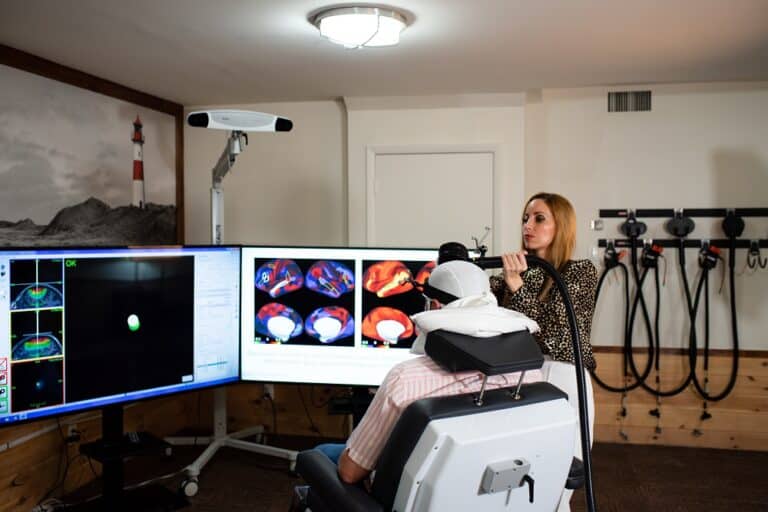
Contact Us

Addiction is a complex disease that alters both brain function and behavior. For those struggling with drug addiction, the condition often creates a cycle of substance use, withdrawal, and cravings that can take over their lives.
Whether it involves legal substances like nicotine and alcohol or illicit drugs, addiction can cause serious health risks and significantly impact relationships, careers, and overall well-being.
At Neurotherapeutix, we offer an innovative approach to long-term recovery with fMRI-guided transcranial magnetic stimulation (TMS) therapy for drug addiction. By precisely targeting the brain’s dysfunctional neural networks, we help patients break free from addiction and regain control of their lives through personalized, non-invasive treatment. Continue reading to learn more.


Drug addiction, also known as substance use disorder (SUD), is a chronic condition characterized by an inability to control substance use despite its harmful effects. It often leads to physical and psychological dependence on drugs, disrupting everyday life and health.
Addiction is influenced by various factors, including:
Drug addiction encompasses various substances, each with unique challenges and risks. Common types include:
Recognizing SUD is crucial for seeking treatment.
Common signs and symptoms include:
If you or a loved one exhibits these signs, seeking professional help is essential.
At Neurotherapeutix, we use a comprehensive approach to diagnose drug addiction:
This detailed analysis allows us to create a personalized treatment plan tailored to your specific needs.
Substance use disorder often requires a combination of treatments to support recovery. Common options include:
For patients with treatment-resistant addiction, innovative options like fMRI-guided TMS therapy can offer new hope by targeting the root causes of dependency.
At Neurotherapeutix, we are pioneers in leveraging fMRI-guided TMS therapy to treat addiction by addressing the underlying brain dysfunction that perpetuates substance use.
Here’s how it works:
Patients often experience measurable improvements, such as reduced cravings and better control over substance use.
Compared to traditional treatments, fMRI-guided TMS therapy offers several unique advantages:
As a leading provider of TMS therapy for drug addiction, Neurotherapeutix offers a compassionate, science-driven approach to recovery.
Whether you’re struggling with nicotine, alcohol, opioids, or other substances, our expert team is here to guide you toward a healthier, addiction-free future.
Take the first step today. Request an appointment or contact us to learn more about our innovative addiction treatments.

TMS therapy uses magnetic pulses to stimulate specific areas of the brain involved in addiction, helping to restore normal function and reduce dependency.

Yes, research has shown that TMS therapy can significantly improve control over cravings and reduce substance use over time.

TMS therapy is ideal for individuals with substance use disorder who haven’t found relief through traditional treatments like medication or psychotherapy.

No, TMS therapy is non-invasive, painless, and free from the side effects of medications or other treatments.

Call us at (917) 388-3090 or click to request a regular or telehealth appointment.
Neurotherapeutix
171 East 74th Street, Unit 1-1 New York, NY 10021

Neurotherapeutix is the leading clinic for functional imaging guided transcranial magnetic stimulation (TMS), a safe, innovative, and non-invasive methodology for treating a wide range of acute and chronic mental disorders and brain injuries. Our advanced fMRI technology allows us to map the brain for the… Learn More »
By: Neurotherapeutix NYC
Reviewed By: Marta Moreno, Ph.D
Published: March 24, 2023
Last Reviewed: September 27, 2024
QUICK INQUIRY
Contact us to get an estimate for your medical services requirements. You can fill in the form to specify your medical requirements or you can call us directly.